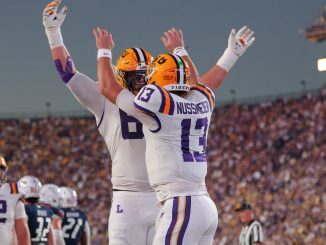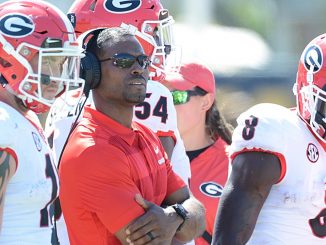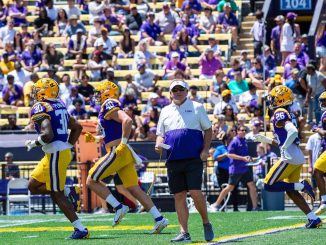
By TODD HORNE, Executive Editor
In a nuanced appellate decision that could reshape how federal courts handle fallout from state litigation, the Fifth Circuit has breathed new life into attorney Larry English’s defamation and conspiracy allegations against two Louisiana lawyers and their firm.
The ruling, issued yesterday, partially overturns a lower court’s outright dismissal of the claims, offering a key clarification on the boundaries of federal jurisdiction while upholding the dismissal of an emotional distress suit tied to the bitter remnants of a high-stakes Title IX probe at LSU.
The saga traces back to a protracted employment discrimination case brought by former LSU Assistant Athletics Director for Football Recruiting and Alumni Relations Sharon Lewis, whom English represented in accusations of sexual harassment and misconduct against ex-football coach Les Miles. That battle ended in defeat for Lewis following a jury trial, but not without repercussions: A Louisiana state court slapped English and Lewis with $330,461.97 in sanctions for what it labeled “fabricating evidence” and “abusive litigation tactics.”
Undeterred, English turned the tables, suing Vicki Crochet, Robert Barton, and their employer, Taylor Porter Brooks & Phillips, L.L.P., in federal court. His complaint charged defamation—stemming from accusations that he invented evidence in court filings—along with intentional infliction of emotional distress (IIED), negligent infliction of emotional distress (NIED), and civil conspiracy.
The Middle District of Louisiana tossed all counts with prejudice last year, invoking the Rooker–Feldman doctrine to nix the defamation claim as an impermissible federal redo of the state sanctions and deeming the IIED allegations too flimsy.
English appealed, arguing his suit targeted the defendants’ courtroom barbs, not the judge’s gavel.
In a per curiam opinion, a three-judge Fifth Circuit panel agreed on the defamation front, vacating the dismissal and sending it back for fresh scrutiny.
“English contends that his injuries were caused not by the state court’s sanctions order itself, but by the Defendants–Appellees’ conduct (through their counsel) during the sanctions proceedings,” the court wrote, stressing that Rooker–Feldman—a 1920s-era bar on federal courts moonlighting as state appellate reviewers—applies only to gripes over the judgment proper, not collateral damage from opposing counsel’s tactics.
Quoting Exxon Mobil Corp. v. Saudi Basic Indus. Corp., the panel reiterated the doctrine’s “narrow” reach: It blocks “state-court losers complaining of injuries caused by state-court judgments,” but not independent claims like English’s for reputational harm from alleged smears.
The lower court, the appeals judges noted, botched this by dismissing with prejudice—a no-go for jurisdictional snags like Rooker–Feldman, which demand a without-prejudice boot.
On remand, the district judge must tackle the defendants’ other dismissal bids, including statute-of-limitations gripes and qualified immunity angles. The conspiracy count rides shotgun: Louisiana law demands a solid underlying tort to fuel it, so with defamation revived, the plot thickens for that claim too.
The panel also greenlit English’s shot at tweaking his complaint, overturning the lower court’s “futility” rebuff.
Not every claim got a second wind, though. The IIED dismissal stuck, as the defendants’ alleged sins—falsely branding English an evidence-faker, courtroom jabs like calling him “sophomoric” and “ignorant,” and dragging him through a Judgment Debtor Exam—fell short of Louisiana’s “extreme and outrageous” bar.
Echoing White v. Monsanto Co., the court held such conduct must be “atrocious and utterly intolerable in a civilized community,” not just garden-variety litigation trash-talk or enforcing legal rights.
English waived his NIED appeal, so that one’s toast by default.
Beyond this dust-up, the decision ripples wider.
It reins in Rooker–Feldman’s “contagious” misuse, distinguishing it from run-of-the-mill preclusion defenses and paving the way for federal damages suits over dirty-tricks litigation without upending state verdicts.
“Rooker–Feldman is not simply preclusion by another name,” the court affirmed, citing Lance v. Dennis.
For litigators, it’s a cautionary tale on IIED’s steep Louisiana climb—mere insults or procedural pokes won’t cut it.
As English’s refiled claims head back to Baton Rouge, this LSU-linked imbroglio underscores the tightrope between state-federal spheres and the armored resilience of courtroom rhetoric. Watch for the district court’s next move; it could etch lasting lines in the sand for attorneys tangled in post-judgment vendettas.
TigerRag.com will have more on this story in the coming days.




Be the first to comment